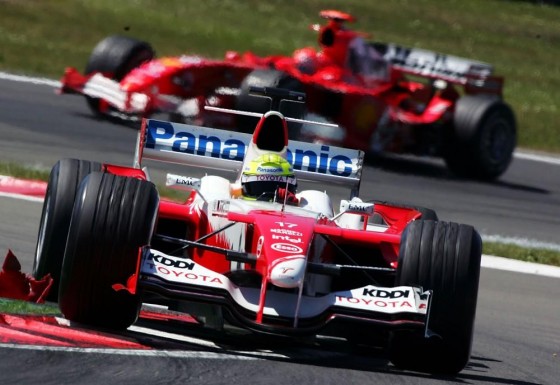 Fans of formula one racing claim that energy saving techniques will ruin all the fun because cars won’t be as noisy!
Fans of formula one racing claim that energy saving techniques will ruin all the fun because cars won’t be as noisy!
Just yesterday we reported on a floating Olympic stadium that could offset the sometimes heavy environmental costs associated with what we almost all love: sport. In preparation for 2022, Qatar will have to build several stadiums for a country that barely registers on the football talent scale, and the influx of visitors is bound to take its toll on energy and water resources.
There is some talk that the new stadiums will be deconstructed and used elsewhere, thereby reducing its environmental footprint. But what about car racing. I don’t mean the goofy Ferarri theme park in the UAE, but the real deal – Formula One racing. Can new regulations mitigate this adrenalin-pumping hobby’s environmental impact?
The National published some fascinating statistics on their news site. Formula One vehicles consume a whopping three miles per gallon – more then twenty miles below what is considered environmentally responsible. And the fuel used to power these beasts has to be shipped great distances, further increasing its CO2 output.
Throughout the 19 race season, the average F1 car travels 160,000 km (off the track), which equates to roughly 100,000 miles (using, we assume, different kinds of transportation methods.) We did a quick calculation. If the 3 mpg vehicle travels just 100,000 miles, its carbon footprint amounts to: 647,333 lbs CO2!
Last year, F1’s “overlord” Bernie Ecclestone – as The National calls him – dismissed the environmental concerns of racing and has recently even proposed spraying water onto the tracks in order to up the ante during races.
Even so, regulations are being put in place that will somewhat improve the sport’s environmental image.
In 2009, certain vehicles were outfitted with a Kinetic Energy Recovery System (KERS), a device that captures the kinetic energy latent in the heat created when cars brake. Not merely an altruistic move, the stored energy can also boost acceleration when the driver takes over other vehicles.
Also, the FIA’s World Motor Sport Council announced that as of 2013, 2.41l V8 engines will be replaced with 1.6 V4 engines, which will result in a 35% efficiency increase in fuel consumption.
Some fans welcome the move, while critics claim the smaller engines will ruin the sport by shutting out the noise.
:: The National
More on cars and transportation in the Middle East:
Solar-Powered Cars Roll Around the World – and In Palestine
Better Place Unveils Its Mammoth Recharging Plan
Ride Abu Dhabi’s Electric Stretch Limo Electric Bus



![Softwheel uses inner suspension arms to re-invent the wheel for bikes and chairs [video] Softwheel uses inner suspension arms to re-invent the wheel for bikes and chairs [video]](https://www.greenprophet.com/wp-content/uploads/softwheel-suspension-bike-370x261-319x225.png)
Comments are closed.